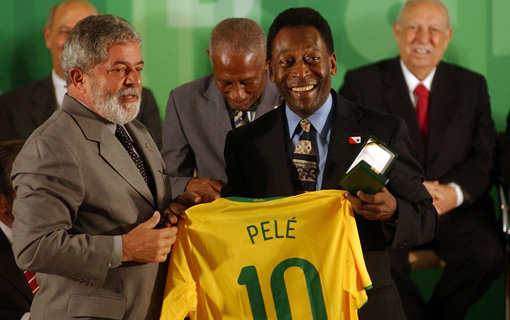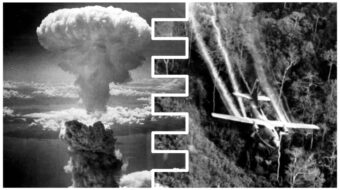
Pelé, the now retired Brazilian professional soccer player widely regarded as the greatest player of all time, was born on this date in 1940 in Três Corações, Minas Gerais, Brazil. His full name is Edson Arantes do Nascimento.
“I was born to play football, just like Beethoven was born to write music and Michelangelo was born to paint,” said Pelé. He was a member of three Brazilian World Cupchampion teams. Pelé became a superstar with his performance in the 1958 World Cup, and played professionally in Brazil for two decades.
Pelé moved with his family to the city of Bauru in the state of São Paulo as a young boy, and grew up in poverty. Still, he developed a rudimentary talent for soccer by kicking a rolled-up sock stuffed with rags around the streets.
As an adolescent, Pelé joined a youth squad coached by Waldemar de Brito, a former member of the Brazilian national soccer team. De Brito eventually convinced Pelé’s family to let the budding player leave home at 15 and try out for the Santos professional soccer club.
Pelé signed with Santos and scored the first professional goal of his career before he turned 16, led the league in goals in his first full season, and was recruited to play for the Brazilian national team.
The world was officially introduced to Pelé in the 1958 World Cup in Sweden. Displaying remarkable speed, athleticism and field vision, the 17-year-old scored three goals in a 5-2 semifinal win over France, then netted two more in the finals, a 5-2 win over the host country.
The young superstar received hefty offers to play for European clubs, but Brazilian President Jânio Quadros had Pelé declared a national treasure, making it legally difficult for him to play in another country. The Santos Club ensured that its star attraction was well paid by scheduling lucrative exhibition matches with teams around the world.
In the 1962 World Cup in Chile, Pelé suffered an injury and sat out the final rounds, but Brazil still went on to claim its second straight title. In 1966 he was again sidelined with leg injuries, and Brazil did not advance in the World Cup.The 1970 World Cup in Mexico marked a triumphant return to glory for Pelé and Brazil. Pelé scored four goals, including one in the final to give Brazil a 4-1 victory over Italy.
After his announced retirement from soccer in 1974, he was lured back to the field the following year to play for the New York Cosmos in the North American Soccer League. Temporarily the NASL became a big attraction. He played his final game in an exhibition between New York and Santos in October 1977, competing for both sides, and retired with a total of 1281 goals in 1363 games.
The decades since have not diminished Pelé’s public profile. In 1978, he was awarded the International Peace Award for his work with UNICEF. He has also served as Brazil’s Extraordinary Minister for Sport, and a United Nations ambassador for ecology and the environment.
Pelé was named FIFA’s “Co-Player of the Century” in 1999, along with Argentine Diego Maradona. To many, his accomplishments on the soccer field will never be equaled, and virtually all great athletes in the sport are measured against the Brazilian who once made the world stop to watch his transcendent play.
Soccer players who witnessed him in action stumbled to find superlatives to describe him. England’s 1966 FIFA World Cup-winning captain Bobby Moore commented: “Pelé was the most complete player I’ve ever seen, he had everything. Two good feet. Magic in the air. Quick. Powerful. Could beat people with skill. Could outrun people. Only 5’8″ tall, yet he seemed a giant of an athlete on the pitch. Perfect balance and impossible vision. He was the greatest because he could do anything and everything on a football pitch. I remember [João] Saldanha the coach being asked by a Brazilian journalist who was the best goalkeeper in his squad. He said Pelé. The man could play in any position.”
Known for his generosity and amiability, he was surrounded by crowds wherever he went. A reporter once asked him if his fame compared to that of Jesus, and Pelé quipped, “There are parts of the world where Jesus Christ is not so well known.”
Feliz aniversário, Pelé!
Sources: biography.com, Wikipedia.
Photo: Brazilian President Lula and Pelé in commemoration of 50 years since the first World Cup title won by Brazil in 1958, at the Palácio do Planalto, 2008. | Wikimedia (CC)










